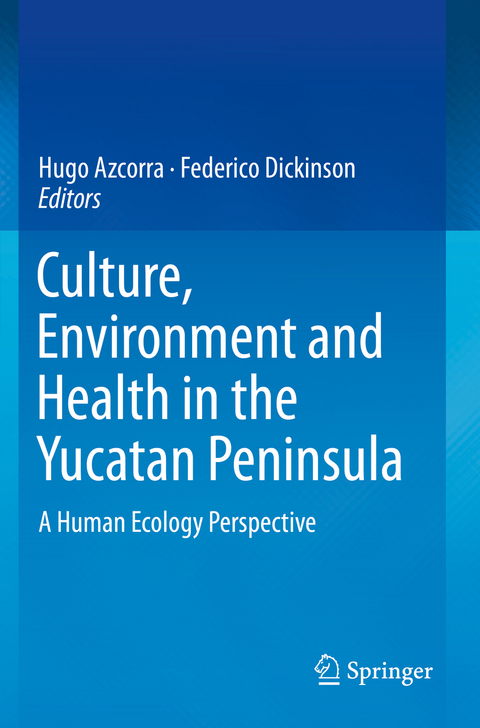
Culture, Environment and Health in the Yucatan Peninsula
Springer International Publishing (Verlag)
978-3-030-27003-2 (ISBN)
This book adopts a human ecology approach to present an overview of the biological responses to social, political, economic, cultural and environmental changes that affected human populations in the Yucatan Peninsula, Mexico, since the Classic Maya Period. Human bodies express social relations, and we can read these relations by analyzing biological tissues or systems, and by measuring certain phenotypical traits at the population level. Departing from this theoretical premise, the contributors to this volume analyze the interactions between ecosystems, sociocultural systems and human biology in a specific geographic region to show how changes in sociocultural and natural environment affect the health of a population over time.
This edited volume brings together contributions from a range of different scientific disciplines - such as biological anthropology, bioarchaeology, human biology, nutrition, epidemiology, ecotoxicology, political economy, sociology and ecology - that analyze the interactions between culture, environment and health in different domains of human life, such as:
- The political ecology of food, nutrition and health
- Impacts of social and economic changes in children's diet and women's fertility
- Biological consequences of social vulnerability in urban areas
- Impacts of toxic contamination of natural resources on human health
- Ecological and sociocultural determinants of infectious diseases
Culture, Environment and Health in the Yucatan Peninsula - A Human Ecology Perspective will be of interest to researchers from the social, health and life sciences dedicated to the study of the interactions between natural environments, human biology, health and social issues, especially in fields such as biological and sociocultural anthropology, health promotion and environmental health. It will also be a useful tool to health professionals and public agents responsible for designing and applying public health policies in contexts of social vulnerability.
lt;b>Hugo Azcorra is a human biologist working in the the Department of Human Ecology at the Center for Research and Advanced Studies of the National Polytechnic Institute in Merida, Mexico (Cinvestav-Merida). He is interested in the biology of populations during early stages of growth and development and how biological conditions are shaped by environmental factors and intergenerational influences. The most of his research have been focused on how chronic adverse living conditions experienced by Mayan populations from Yucatan have impacted their biological conditions.
Federico Dickinson is a Mexican biological anthropologist and human ecologist with a Sc.D. from the Polish Academy of Sciences. Dr. Dickinson is the founder of the Department of Human Ecology at the Center for Research and Advanced Studies of the National Polytechnic Institute in Merida, Mexico (Cinvestav-Merida), where he has developed his research lines on human growth in the last 33 years.
Introduction.- The thin broken line. History, society, and the environment on the Yucatan Peninsula.- Globalization and children's diets: The case of Yucatan, Mexico.- Growth stunting and low height-for-age in the Yucatan Peninsula.- The urban Maya from Yucatan; dealing with the biological burden of the past and a degenerative present.- A critical biocultural perspective on tourism and the nutrition transition in the Yucatan.- Effect of salaried work in cities and commercial agriculture on natural fertility in rural Maya women from the Yucatan Peninsula, Mexico.- Association between early developmental stress, as evidenced by linear enamel hypoplasias (LEHs), and body composition during adolescence in agricultural populations with different access to store foods and gendered activity patterns.- Hydration, lactation, and child health outcomes in Yucatec Maya.- Patterns of activity and somatic symptoms among urban and rural women at midlife in the state of Campeche, Mexico.- Environmental and cultural stressors in the coastal northern Maya lowlands in pre-Hispanic times.- History of health and life of pre-hispanic Maya through their skeletal remains.- Crossing the threshold of modern life. Comparing disease patterns between two documented urban cemetery series from the city of Merida, Yucatan, Mexico.- Health and wellbeing in the Yucatan Peninsula revisited with a human ecology perspective.- Hair mercury content in an adult population of Merida, Yucatan Mexico as a function of anthropometric measures and seafood consumption.- Tackling exposure to Chagas Disease in the Yucatan from a human ecology perspective.- Conclusions.
| Erscheinungsdatum | 03.01.2021 |
|---|---|
| Zusatzinfo | XIII, 336 p. 48 illus., 25 illus. in color. |
| Verlagsort | Cham |
| Sprache | englisch |
| Maße | 155 x 235 mm |
| Gewicht | 536 g |
| Themenwelt | Medizin / Pharmazie ► Medizinische Fachgebiete ► Arbeits- / Sozial- / Umweltmedizin |
| Studium ► Querschnittsbereiche ► Prävention / Gesundheitsförderung | |
| Sozialwissenschaften ► Ethnologie | |
| Schlagworte | Bioarchaeology and health • Culture and health • environment and health • Growth stunting • human ecology • Living conditions and human biology • Mayan populations • Nutritional status • yucatan peninsula |
| ISBN-10 | 3-030-27003-3 / 3030270033 |
| ISBN-13 | 978-3-030-27003-2 / 9783030270032 |
| Zustand | Neuware |
| Haben Sie eine Frage zum Produkt? |
aus dem Bereich


